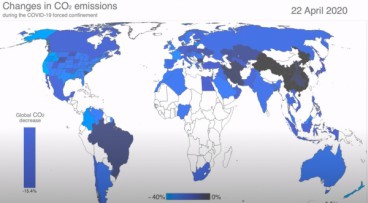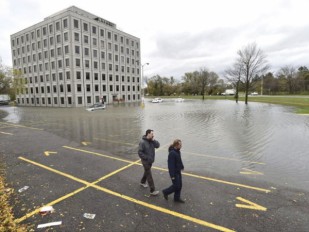Canada Pledges to Reduce Greenhouse Gas Emissions by 2030, No Regulations for Oil Sands

Canada has announced new goals to greenhouse gas emissions to thirty percent below 2005 levels by 2030. The announcement has received criticism for not addressing the oil sands in Alberta. The pledge comes just prior to a meeting between the Canadian provinces in June and a major climate change conference in Paris in December. The pledge was formally submitted to United Nations Framework Convention on Climate Change on Friday.
Canada has announced new goals to greenhouse gas emissions to thirty percent below 2005 levels by 2030. The announcement has received criticism for not addressing the oil sands in Alberta. The pledge comes just prior to a meeting between the Canadian provinces in June and a major climate change conference in Paris in December. The pledge was formally submitted to United Nations Framework Convention on Climate Change on Friday.
While the new target is almost double Canada’s previous pledge, critics are quick to point out that the plan avoids previously promised regulations on the oil sands. Canada currently produces an estimated 170 billion barrels of oil daily from the world’s third largest energy reserves. Daily oil production is expected to more than double by 2025. Saudi Arabia and Venezuela have the two largest reserves. Prime Minister Stephen Harper has been reluctant in the past to slow the growth of the nation’s energy industry which is looking to become an energy super power.
The plan calls for new rules for natural gas-fired power plants and the chemical industry and also reductions in methane emissions in the oil and gas sector. The reductions are sought mainly in flaring and industrial leaks. Though the plan does not impose any regulations on the oil sands it does call for technological innovation to improve environmental performance in the oilsands which accounted for more than ten percent of the methane emissions from the oil and gas sector in 2012. The plan is set to rely heavily on provinces to achieve emissions reductions by regulations or otherwise.
The United States, Japan, and the European Union have already committed to similar reductions for the next ten to fifteen years.
Sources: New York Times, Canadian Broadcasting Corporation
Want to read more like this story?

EPA Releases Greenhouse Gas Emissions Data from Large Facilities
Oct, 03, 2014 | NewsToday, the U.S. Environmental Protection Agency (EPA) released its fourth year of Greenhouse Gas Rep...

Norway aims to achieve carbon neutrality by 2030, twenty years ahead of schedule
Aug, 19, 2016 | NewsThe country’s gesture is more than welcome, although there is a lot of skepticism regarding it...

New York City major to ban glass skyscrapers with high greenhouse emissions
Apr, 25, 2019 | NewsBill de Blasio, New York City major, has decided to ban the erection of energy inefficient glass sky...

Historic deal to address shipping emissions
May, 09, 2018 | NewsShipping, previously excluded from climate agreements, should now cut CO2 emissions by at least 50%...

17% carbon emissions reduction during COVID-19 lockdown
May, 19, 2020 | NewsAccording to a new study, global carbon emissions have been reduced by 17% during the lockdown follo...

BP’s Clair platform leaks 95 tonnes of oil into North Sea
Oct, 11, 2016 | NewsThe company says will leave the oil to disperse naturally The company says will leave the oil to...

No new oil and gas exploration in France beginning next year
Jul, 11, 2017 | NewsPhoto source: Independent The country will stop granting new licenses, as part of a transition towa...

Canada changes its building code to tackle climate change
Apr, 15, 2019 | NewsCanada's building code is heading towards environmental sustainability. The new regulations will be...

Oklahoma Oil Hub Damaged by Earthquake
Nov, 08, 2016 | NewsOn Sunday evening, a 5.0 magnitude earthquake struck Cushing, Oklahoma, a major oil hub and one of t...
Trending

Taipei 101’s impressive tuned mass damper

Characteristics of Load Bearing Masonry Construction

China Completes World’s Longest Expressway Tunnel, Redefining Connectivity

The Line at Neom faces feasibility reassessment while construction continues




